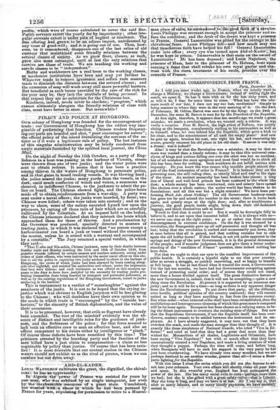PIRACY AND POLICE AT HONGKONG.
Oust colony of Hongkong was founded for the encouragement of trade : our Government of Hongkong has the oddest way ima- ginable of performing that function. Chinese traders frequent- ing our ports are boarded and shot, " pour encourager les autres"; the official policy of the island literalizing the sarcasm of the sa- tirist as if it were a legitimate rule of policy. The last instance of this singular administration may be briefly condensed from ample materials furnished by the spirited local journal, the China Mail. On the night of Sunday the 15th October, as a party of Eng- lishmen in a boat was passing in the harbour of Victoria, stones were thrown from one of two junks; and the water police were sent to obtain redress. It seems that it has been a practice among thieves in the waters of Hongkong to personate police, and in that guise to board trading vessels. It was blowing hard ; the police neared the junks; many yards from the vessels, in the dark, amid much confusion of winds and voices, a summons was shouted, in indifferent Chinese, to the junkmen to admit the po- lice on board. The Chinese showed fight, and the police-boats made off to obtain reinforcements from a war-ship. A party was sent under a naval officer; the junks were boarded, by force; two Chinese were killed; others were taken into custody ; and on the way to shore, some of the sailors executed Lynch law upon the prisoners, by cutting off those tails of hair which are so carefully cultivated by the Celestials. At an inquest held on the bodies, the Chinese prisoners declared that they mistook the boats which approached them for those of thieves. And a proclamation by the Governor was produced, specially directed to masters of trading junks, in which it was declared that "no person except a harbourmaster can board a junk or vessel without the consent of the master, unless he is armed with a warrant and accompanied by a constable." The Jury returned a special verdict, in which they said— "That U-afoo and Niu-achiu, Chinese junkmen, came by their deaths between Sunday night and Monday morning the 15th and 16th of October 1848, from gunshot wounds inflicted by certain seamen and marines unknown, acting under orders of their officers, who were instructed by the senior naval officer on this sta- tion to aid the police in capturing two junks anchored in-shore in the harbour of Hongkong, the crews of which junks had been alarmed by boats coming along- side after nightfall, and resisted the authorities and others, under the impression that they were thieves: and such resistance as was offered on this occasion ap- pears to the Jury to have been justified by the necessity for trading junks pro- 'meting themselves from being boarded by strangers and pretended policemen, as well as by the existing regulations of the Hongkong Government, issued to junks anchoring in the harbour.
This is tantamount to a verdict of " manslaughter" against the
assailants of the junks. It is not to be hoped that the crying in- justice which was obvious to English jurymen will be less glaring to the Chinese ; who will doubtless have their own opinion as to the mode in which trade is "encouraged" by the "outside bar- barians," to the sincerity of British diplomatists, and the value of their assurances. It is to be presumed, however, that evils so flagrant have already been amended. The root of the mischief evidently was the ab- sence of distinct and intelligible rules for the guidance of junk- men, and the feebleness of the police ; for that force seemed to lack both an effective crew to man an effective boat, and also an officer competent to his duties either by intelligence or "pluck." Of course those defects have been remedied by this time? The prisoners arrested by the boarding party and the families of the men killed have a just claim to compensation—a claim no less cognizable by policy than justice. Of course that has been satis- fied? It is most desirable that our central station in the Chinese waters should not exhibit us as the rival of pirates, whom we can emulate but not drive away.


























 Previous page
Previous page